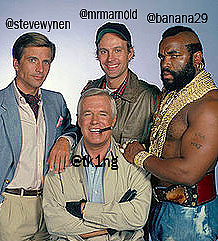 |
| We look good... |
One of the arguments I made was that bringing your own device to class does not imply technological skill, and may ultimately hurt a student as much as help them. It certainly does nothing but disrupt learning in a class if no one in the room actually knows how to problem solve and/or effectively use the device - especially a device where familiarity is founded upon its entertainment value - using that device for a previously unexpected purpose is perilous indeed! Students who own their own device but have very little actual facility with it aren't served by trying to include it, unsupported, in an effective learning environment.
From the student who got the two thousand dollar camera and was going to return it because 'it took bad pictures' (it was set on web-sized 600x800 pixels, it was a 24 megapixel DSLR...), to the student with the new laptop that only has stolen games, videos, pornography and oodles of viruses on it, unstructured BYOD is a technological (and learning) quagmire in the making. The assumption that because someone owns a digital tool that they know how to effectively use it is just that, a huge assumption; not exactly sound pedagogical practice.
How we assess and teach digital fluency lacks any cohesion at all, yet everyone is itching to throw ipads at students. The problem goes well beyond student technological prowess to include many teachers as well. If we're going to produce students ready and relevant to future workplaces then we really need to get a handle on our expectations around effective use of digital technology.
To that end it is well past time to begin developing a digital skills continuum - an objective, mastery based learning continuum (no, 50% is not a pass). You either know how to use digital tools effectively, or you don't, and it's time to figure out who knows what.
It's early days yet, but it seems to me that digital fluencies break down into two fundamental areas, like the technology itself. One side is communication/data driven and involves effective management of information in digital environments. The other side is the technical/hardware side of the equation and how fluent you are with using technology to access digital information. Both sides can be broken down further...
Any one of these particulars may be further developed to create a more nuanced understanding of a person's digital fluency. Even regular users might be surprised by their lack of breadth in this area. Knowing how to do one thing, over and over again on a specific (single) device well does not make you an expert.
Many years ago when I went for my Comptia A+ and Net+ certifications, I became aware of what the differences between a keen amateur and a professional were when it comes to computer technology. The first time I took a practice exam I was stunned to be getting in the forty percents, I thought I was an expert. That testing process is grueling and requires a 75% pass rate. You don't get to call yourself an expert by getting it half right (why we think 50% is a pass is beyond me). I'd like to bring some of that objective credibility to this digital skills continuum. People need to be able to articulate and demonstrate what they know. Guessing is where we are now, we need to move beyond that.
I'd also like to hook up differentiation of and access to technology based on how people are able to demonstrate their digital fluency. A teacher with low digital fluency can access a supported lab, but the more advanced teacher can access diverse mini/mobile labs or even, eventually, a bring your own device model of learning, but only if they have clearly demonstrated the mastery needed to make that quagmire actually work.
| BYOD - MINILAB - SCHOOL LAB: diversified technology digital skills continuum |
We've painted ourselves into an ineffective corner when it comes to teaching digital literacy, and as a result we're graduating students who are having a great deal of trouble transitioning to the twenty first century workplace. This technology change is happening so quickly that society and the education system that serves it, is having trouble keeping up. Digital fluency (where it exists at all) has generally been self taught, and as a result it is unevenly distributed and almost impossible to quantify; it's all quite magical. Teachers who don't have much in the way of digital fluency aren't being assisted to improve it, meanwhile the rogue, commando types are just going off and doing it on their own. Classrooms within the same department in the same building appear completely different in terms of teaching digital fluency.
A ministry initiative to develop a continuum of learning around the digital skills of everyone involved in the learning process would be a great place to start. I hope our board and the ministry itself recognizes what an important and timely piece of pedagogical development this is and gives us a chance to further develop it.
